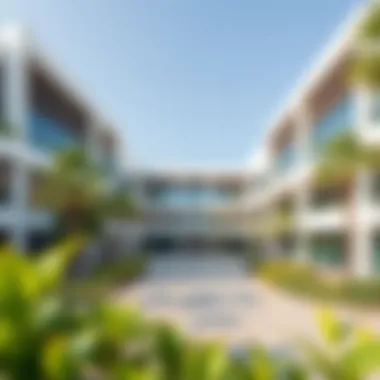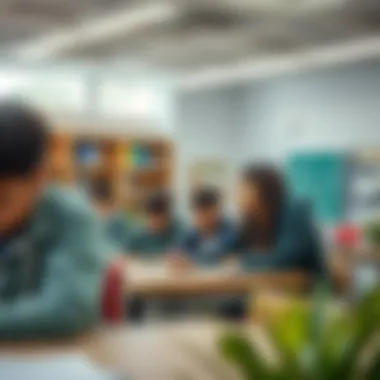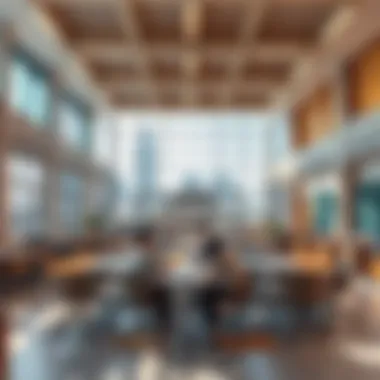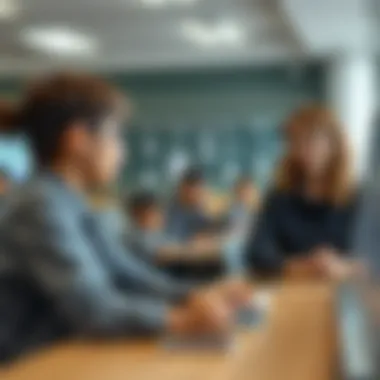Exploring Schools in Dubai: Your Guide to Education


Intro
Dubai's educational landscape is as dynamic and vibrant as the city itself. As a melting pot of cultures, it caters to a diverse population of expatriates and local residents. With myriad options available, families often find themselves at a crossroads when selecting the right school. From international schools to local institutions, each offers unique curricula and extracurricular opportunities. Parents are keen to provide their children with the best educational environment, which is often a hard nut to crack.
This article dives deep into the intricacies of schooling in Dubai, highlighting essential themes such as the variety of school types, the educational frameworks on offer, and the influential factors that guide parents' decisions. In a city where educational choices can be a matter of prestige, understanding the key elements can make all the difference. This journey will not only inform but also guide parents and prospective investors on navigating through the ever-evolving educational sector in this fast-paced city.
Market Trends in Dubai Real Estate
The real estate market in Dubai is invariably linked to the educational prospects available in the city. With a surge in demand for quality education, neighborhoods with notable schools tend to see a spike in property values. Investors looking to make savvy decisions should be mindful of this connection.
Current Market Overview
The current market showcases a resilient stance. Properties near reputable schools consistently attract families willing to pay a premium for convenience and quality education access. Locations such as Dubai Silicon Oasis and Jumeirah Village Circle have emerged as popular choices due to their proximity to well-rated educational institutions. This strong correlation between educational infrastructure and real estate demand paints a compelling picture for investors.
Price Trends and Forecasts
Real estate prices in Dubai predominantly follow cycles influenced by various macroeconomic factors and educational trends.
While growth remains visible, it is variability that's crucial. A closer look reveals that areas with top-notch schools recorded price increases averaging 10-15% annually, contrasting with locations lacking these facilities. Investors eyeing properties in regions with emerging educational establishments must stay attuned to forecasts which indicate a continued upswing in value.
Investment Opportunities
For investors, the interplay between education and property value presents numerous opportunities. Understanding the geographical and market dynamics is key to leveraging potential gains.
Hot Areas for Investment
- Dubai Marina: Known for its luxury, families flock here for marine views and high-quality schools like the American School of Dubai.
- Arabian Ranches: This area features well-regarded schools such as JESS, enhancing its appeal for families.
- Downtown Dubai: Renowned for its attractions, proximity to esteemed schools boosts demand significantly here.
Rental Yield Analysis
Examining rental yields in school-adjacent properties reveals strong returns. Areas within 1 kilometer of respected institutions often see rental yields upwards of 7%. This higher yield underscores the importance of educational institutions in the property market.
"Investing near high-quality schools is not just about immediate financial gain; it's about future-proofing your investment against market fluctuations."
As families increasingly consider educational prospects in their housing decisions, whether they are searching for a home or an investment opportunity, the spotlight on schools will likely shine brighter. Having grasped the depths of this intertwining relationship, investors and families can strategically approach the transformative landscape that Dubai offers.
The Educational Landscape in Dubai
Understanding the educational landscape in Dubai is crucial for parents, investors, and anyone interested in the rapid development of this vibrant city. This landscape is not just a reflection of the area’s commitment to quality education, but also sheds light on its unique demographic and socioeconomic fabric.
The variety of schools available—ranging from international to private and public institutions—addresses the needs of a cosmopolitan populace. As families from different backgrounds settle in Dubai, the demand for diverse educational choices continues to rise. This demand drives the establishment of numerous schools, each offering different curricula, facilities, and cultural experiences.
Historical Context
Dubai's educational system has evolved considerably over the decades. Initially, education in Dubai was informal and often centered around religious institutions. These traditional schools focused on Arabic and Islamic studies. However, as the city transformed into a global hub fueled by economic growth, the education sector began to reflect this change.
In the 1970s, with the formation of the United Arab Emirates, the government prioritized educational reform, setting the stage for an organized system. The establishment of the Ministry of Education paved the way for standardization and regulation. Fast forward to today, Dubai boasts a blend of international educational standards while retaining cultural roots, making it a melting pot of learning opportunities.
Demographics and Schooling Statistics
The demographics of Dubai play a crucial role in shaping its educational landscape. With over 200 nationalities represented among its residents, the need for diverse schooling options is paramount. As of the latest reports, approximately 60% of students in Dubai attend private schools, highlighting a trend that favors alternative educational models over public schooling.
The enrollment statistics clearly illustrate this trend:
- Private Schools: Nearly 230,000 students are enrolled in these institutions, representing a variety of curricula including British, American, and IB.
- Public Schools: Approximately 197,000 students are enrolled, primarily consisting of Emirati nationals, emphasizing the government's efforts to ensure education for its citizens.
- International Schools: This category has seen exponential growth, catering especially to the expatriate community, with schools offering curricula from around the world.
Given these statistics, it is clear that the educational landscape not only serves utilitarian purposes but also signifies the dynamics of a diversifying society. Parents looking to invest in Dubai must understand both the quality and variety of education available to make informed choices.
Types of Schools Available
When it comes to selecting the right educational institution for a child, there are numerous types of schools catering to the diverse population in Dubai. Understanding these various options is crucial for parents and investors alike, as it reveals the unique educational offerings available by highlighting each type's strengths, weaknesses, and overall approach to learning.
International Schools
International schools in Dubai are quite popular, loved for their global perspective and diverse environments. They often follow a specific curriculum that may align with various national education systems, aiming to provide a universal learning experience. Benefits include exposure to a mix of cultures, languages, and worldviews - crucial for fostering a well-rounded education. Moreover, these schools frequently employ teachers from various countries, enriching the educational experience. However, parents should note that tuition fees can be on the higher side, reflecting the comprehensive education offered.
Private Schools
Private schools present an alternative to public education, generally funded through tuition fees collected from students’ families. The educational quality at private institutions often varies, allowing parents the flexibility to select a school that best matches their child's learning style and needs. Many private schools boast smaller class sizes, enabling more personalized attention. However, it's important for parents to thoroughly examine the reputation and performance of private schools, as not all provide the same level of academic excellence.


Public Schools
Public schools in Dubai are operated by the UAE government and cater primarily to Emirati students, offering education at no cost to residents. These institutions vary significantly in quality and resources, influenced by the district and local administration. A standout feature of public schools is the inclusion of the UAE’s national curriculum, which emphasizes Arabic language and culture. Nevertheless, expatriate families might find public schools less appealing due to language barriers and fewer international programs.
British Curriculum Schools
British curriculum schools are tailored for students whose families prefer the structure and recognition of the UK education system. These schools adhere to the National Curriculum of England, offering IGCSEs and A-levels, which are highly regarded globally. A benefit of this approach is the extensive range of subjects and extra-curricular activities offered. Nonetheless, competition for spots can be fierce, and annual tuition fees are often substantial, reflecting the quality of education provided.
American Curriculum Schools
Those looking for education aligned with the United States often turn to American curriculum schools, which focus on a hands-on, inquiry-driven method of teaching. These schools prepare students for SATs and Advanced Placement courses, facilitating a seamless transition to colleges and universities in the U.S. Families appreciate the emphasis on creativity and critical thinking skills. Still, the comprehensive nature of this curriculum often means higher costs.
IB Schools
International Baccalaureate (IB) schools are renowned for their high academic standards, emphasizing critical thinking and global awareness. The IB program is recognized worldwide, making it an attractive option for expatriate families. Students engage in a challenging curriculum that includes community service and research projects. However, families must consider that the demanding nature of this program may not suit all students, particularly if they're looking for a more relaxed educational journey.
"Choosing the right type of school can significantly impact a child's educational journey and future opportunities."
Navigating the educational landscape in Dubai can be daunting, but understanding the types of schools available allows for informed decision-making. By weighing the pros and cons of each type, parents can ensure they find the right fit for their children.
Factors Influencing School Selection
Selecting a school for a child can be like finding a needle in a haystack, especially in a city as dynamic as Dubai. It's not just about picking the closest school; numerous factors come into play. For expatriates and locals alike, the right choice can shape their child's future. This section unpacks the critical elements influencing school selection, giving parents and investors a clearer picture of what to prioritize.
Curriculum Preference
Choosing a curriculum isn't just a matter of preference; it can steer a child's educational experience for years. Schools in Dubai offer a variety of curricula, such as the British, American, and International Baccalaureate (IB). Each system has its strengths and weaknesses, appealing differently to diverse families. For instance, the British curriculum emphasizes structured learning and exam readiness, making it popular among families who value a rigorous academic approach.
Parents might ask themselves:
- What teaching methods resonate with my child?
- Will this curriculum support my child's targeted higher education goals?
Ultimately, understanding what each curriculum offers helps parents align their choice with their child's needs.
Location and Accessibility
When it comes to school selection, location can be a deal-breaker. A school that’s just around the corner might be tempting, but the commute can often affect a child's experience. Families may find that a good school located farther away offers better quality education. The real challenge lies in balancing distance with quality.
Factors to consider include:
- Proximity to home: Shorter commutes often lead to less stress.
- Public transport availability: Ensuring accessibility for all family members.
- Traffic conditions: Navigating through rush hours can impact daily schedules.
For investors, understanding the demographics of an area can inform them of potential school popularity and demand.
Reputation and Accreditation
A school’s reputation can often speak volumes about the quality of education offered. Parents frequently seek schools with strong track records of student success and positive community feedback. Accreditation is another crucial factor—schools that meet established standards often provide better educational outcomes.
When investigating a school's reputation, consider:
- Word of mouth: Personal recommendations from trusted sources.
- Ofsted or KHDA ratings: Regulatory bodies provide valuable insights through evaluations.
- Alumni success: The accomplishments of previous students can indicate the school's effectiveness.
"A school's reputation isn't built overnight, but the perceptions and outcomes can stick for a lifetime."
Cost of Education
Costs associated with education can vary widely in Dubai, often based on factors like curriculum type, institution reputation, and facilities provided. Parents must weigh their financial capabilities against quality education, which can be a significant determinant in their decision-making process.
Key considerations include:
- Tuition fees: Understanding the total cost annually.
- Additional expenses: Costs like uniforms, materials, and extracurricular activities can accumulate.
- Scholarship opportunities: Exploring available financial aid might ease the burden.
In the real estate market, understanding educational costs can influence decisions, especially for those planning to settle in specific areas known for their school districts.
Regulatory Framework
In the context of education in Dubai, the regulatory framework is crucial. It serves as a backbone that ensures educational quality, safety, and accessibility within the diverse landscape of schools. With a rapidly growing expatriate population, regulations are essential to maintain a standard that fosters trust among parents looking for suitable educational options for their children. This framework influences not just the operational aspects of schools, but it also shapes the broader educational environment in which students learn.
The Knowledge and Human Development Authority


The Knowledge and Human Development Authority (KHDA) plays a vital role in the educational setup of Dubai. Established in 2006, its main responsibility is overseeing the quality and standards of private education in Dubai. This semi-governmental authority is not just a regulatory body; it's a facilitator of growth and quality enhancement within the education sector.
KHDA conducts regular inspections, evaluates the performance of schools, and publishes comprehensive reports on their findings. The schools are graded on a scale that ranges from "Outstanding" to "Unsatisfactory." This grading system helps parents decide which schools to consider for their children, thereby influencing school choice significantly. Moreover, KHDA actively promotes innovation and educational excellence by launching initiatives that encourage schools to adopt new teaching methodologies and technologies.
With this oversight, parents can feel more assured about the quality of education that their children receive, knowing that schools are held to a high standard. The KHDA's efforts aim not only to elevate educational standards but also to support schools in delivering curricula that meet local and international benchmarks.
School Licensing and Inspections
Licensing and inspections conducted by KHDA are paramount in creating a structured educational environment. To operate legally, schools must secure a license from KHDA. This process requires schools to comply with specific regulations that cover various aspects such as curriculum standards, teacher qualifications, and facility requirements. The licensing process is rigorous, aiming to filter out schools that do not meet the set criteria before they can widely enroll students.
Inspections occur annually, evaluating aspects like:
- Curriculum delivery
- Student welfare and safety
- Facilities and resources
- Overall academic performance
The outcomes of these inspections are published in detailed reports that are accessible to the public. This transparency not only allows parents to make informed decisions but also keeps schools accountable for their performance. Schools that struggle to meet standards may face remedial actions, and continual failure can result in closure.
"A robust regulatory framework is essential for fostering a quality education environment, especially in a multicultural hub like Dubai."
The approach taken by KHDA exemplifies a commitment to quality, making it easier for both local and foreign investors to recognize the value of Dubai's educational offerings. In a realm where educational excellence is a pillar for community development, understanding the regulatory framework becomes paramount for any stakeholder invested in the future of education in Dubai.
Trends in Education in Dubai
The educational landscape in Dubai is constantly evolving, reflecting the diverse needs of its residents and the demands of a global economy. In this section, we delve into the current trends shaping education in the emirate, focusing on three pivotal areas: technological integration, the emphasis on STEM subjects, and soft skills development. Understanding these trends can aid not only parents but also investors and educational stakeholders in navigating the intricate world of Dubai's schools.
Technological Integration in Schools
As the saying goes, "The future is now." The integration of technology in schools across Dubai is more than just a trend; it is an essential component of modern education. Smart boards, tablets, and online learning platforms have become standard tools in classrooms. For instance, many schools now utilize virtual reality to create immersive learning experiences in subjects like history and science. This exciting use of technology not only keeps students engaged but also prepares them for a workforce that increasingly relies on digital competencies.
However, the implementation of technology does come with its challenges. Schools must ensure equitable access to tools, particularly in a diverse environment where students come from various socio-economic backgrounds. Moreover, the proper training of educators in leveraging these technologies effectively is critical. If teachers are not tech-savvy, even the most sophisticated gadgets in the classroom won't be fully utilized. Therefore, a balanced approach that includes both students and teacher training is vital for successful technological integration.
Focus on STEM Education
In recent years, there has been a noticeable shift towards emphasizing STEM education (Science, Technology, Engineering, and Mathematics). This focus is driven by the recognition of the critical role these subjects play in the global economy. Schools in Dubai, such as the Dubai American Academy, have developed specialized programs aimed at fostering a passion for these fields among students. Robotics clubs, coding classes, and science fairs are merely the tip of the iceberg in a growing movement to provide students with real-world problem-solving skills.
The benefits of this shift are impactful and long-lasting. Students not only gain fundamental skills but also learn how to think analytically and work collaboratively—capabilities that are indispensable in today’s job market. Furthermore, the rising number of partnerships between schools and local industries serves to enhance educational outcomes by providing students opportunities for internship and practical experience.
Emphasis on Soft Skills Development
While academic proficiency is crucial, it is soft skills development that truly sets students apart in the competitive global landscape. Skills such as communication, teamwork, and emotional intelligence are increasingly recognized as essential for success. Schools in Dubai, like the International School of Choueifat, are incorporating programs focused on these abilities into their curricula. Activities ranging from group projects to peer-led discussions encourage students to develop these valuable interpersonal skills.
Soft skills are an area where expatriate communities significantly impact school culture. With diverse backgrounds and experiences, both students and parents foster environments where communication and collaboration are valued. As more international families settle in Dubai, schools find themselves adapting to meet a broad range of cultural perspectives, translating to an enriched educational experience.
As Dubai's educational framework shifts to embrace these trends, both parents and investors should remain vigilant, ensuring they understand how these elements can affect educational quality and long-term student success.
The trends in education in Dubai reflect broader global practices yet are uniquely shaped by local needs and values. Keeping an eye on these changes not only informs educational choices but also highlights the continuous evolution of a city's approach to learning.
The Role of Expatriate Communities
Expatriate communities play a pivotal role in shaping the educational landscape in Dubai. As a melting pot of cultures, the city has attracted families from all over the world, leading to a rich diversity of schools tailored to meet the various needs of these international populations. This section delves into how expatriate communities influence school diversity and modify parental involvement in education.
Impact on School Diversity
The influx of expatriates into Dubai has created a vibrant tapestry of schools representing distinct educational philosophies and curricular frameworks. With such a wide range of families relocating here, educational institutions have had to adapt rapidly to accommodate different cultural expectations and values. Given that expatriates often prefer certain curricula familiar to them, there has been an impressive rise in international schools that offer British, American, and IB (International Baccalaureate) programs.
This diversity in school types is a reflection of the global perspective brought in by expatriates. For instance:
- International Schools: These schools offer a curriculum that aligns with families’ home countries, appealing to expatriates seeking continuity in their children’s education.
- Culturally Inclusive Programs: Many schools now incorporate multicultural education methods that not only respect but celebrate differences among global student bodies.
As a result, parents have an array of options suited to their preferences, making the schooling journey in Dubai as varied as the city's population itself. Moreover, schools often engage in community outreach, inviting family participation to further enrich the educational experience.
Parental Involvement and Influence
Expatriate parents actively shape school communities and influence educational outcomes in marked ways. Their diverse backgrounds often bring unique perspectives into the classroom, enhancing not only the educational experience for students but also the overall school environment. Parents engage in shaping curricula, establishing extracurricular activities, and organizing cultural events that reflect their backgrounds. This collective involvement creates a broader educational milieu that remains responsive to community needs.
The dynamics of parental involvement can be summarized through several key aspects:
- Cultural Enrichment: Expat parents frequently organize events that introduce their heritage, such as festivals and international days, fostering a sense of community.
- Career Support: Many expatriate parents bring professional expertise to school activities, offering workshops and seminars that enrich students’ understanding of global careers.
- Feedback Channels: Schools often establish regular communication with parents to gather insights and feedback, allowing a smooth flow of ideas, which leads to ongoing improvements in educational practices.
"The collective input from expatriate communities leads to an adaptive educational framework that benefits all students, creating environments where diversity is the norm rather than the exception."


In summary, expatriate communities in Dubai not only enhance school diversity but also significantly influence parental involvement and support cultural richness in educational settings. This dynamic interaction helps shape a unique and resourceful education system that prepares every child not just for academics but for thriving in a globalized world.
Quality of Education
In a rapidly developing metropolis like Dubai, the quality of education stands as a paramount concern for both parents and stakeholders considering investments in schools. The educational framework of the city is evolving, driven by a blend of local traditions and international standards. It is essential to recognize how the quality of education impacts not just students, but also the broader community and economy.
Quality education in Dubai reflects a commitment to preparing students for a globalized world. Parents often look for schools that offer robust curricula and practice innovative teaching methods, aiming to foster critical thinking and creativity among students. These elements are not just a matter of personal preference; they are vital for ensuring that students are equipped with the necessary skills to thrive in an increasingly competitive job market.
Moreover, the quality of education extends beyond academics. Extracurricular activities, teacher-to-student ratios, and individual attention received by students also play a crucial role. All these factors make it easier for students to discover their potential while also offering a balanced approach to education, which is foundational to their success.
“Quality education doesn’t end at the classroom door; it shapes the very fabric of society and future prosperity.”
Standardized Testing and Results
In understanding the quality of education, standardized testing emerges as a key element. Tests like the International Baccalaureate, IGCSE, and SAT serve an important function, evaluating the knowledge and skills students acquire during their educational journey. These results are not merely numbers; they are a reflection of teaching efficacy and curriculum effectiveness.
Improving educational standards hinges on analyzing these test outcomes. Schools that regularly assess their students through these standardized tests can pinpoint areas needing improvement and adapt their teaching methodologies accordingly. As such, higher test scores often correlate with institutions known for strong academics and effective instruction.
Another advantage is that parents have access to these results when making informed decisions about where to enroll their children. A school with a history of high performance can provide reassurance and boost the confidence of families relocating to Dubai, underscoring the perceived competitiveness of schools.
Teacher Qualifications and Training
Teachers are the backbone of any educational system, and in Dubai, there is a growing emphasis on ensuring they are not just qualified but also highly trained. The best institutions recognize that effective teaching goes beyond a degree. Thus, they prioritize ongoing professional development, often providing teachers with opportunities to advance their skills through workshops and seminars.
In Dubai, foreign teachers, particularly those hailing from the U.K. or U.S., are commonplace, bringing diverse pedagogical perspectives. However, schools must also ensure these teachers understand the local context, culture, and educational expectations. By fostering a continuous learning environment, schools contribute to better educational outcomes for students, ultimately increasing the appeal of their institutions.
Closure
The quality of education in Dubai is not a standalone aspect. It intertwines with standardized assessments, the professionalism of the educators involved, and the very fabric of the community. By focusing on these key elements, parents and investors can navigate the complex educational landscape in the city. For further reading, resources like Wikipedia’s overview on education, or insights from institutions like The Knowledge and Human Development Authority can provide additional context.
Future of Education in Dubai
As Dubai continues to evolve into a global hub for business, tourism, and education, the future of education in the emirate stands as a topic of vital importance. This subject showcases how reforms and innovations are being ushered in to better prepare students for the challenges of a rapidly changing world. With a blend of traditional values and modern technology, educational institutions in Dubai are paving the way for a new era of learning, emphasizing adaptability and forward-thinking.
Emerging Educational Models
In Dubai, educational models are becoming increasingly innovative. International systems such as Montessori and Reggio Emilia are gaining traction as they focus on child-centered learning. These frameworks encourage creativity and critical thinking over rote memorization, needs of today’s students. Additionally, project-based learning is getting more attention. It involves students working on real-world problems, fostering collaboration and a deeper understanding of complex topics.
- Flipped Classrooms: An emerging trend where students engage with new material at home, usually through videos, and then practice what they learned in class, thus maximizing time with educators.
- Online Flipped Schools: Some institutions are offering a full virtual learning experience, combining the benefits of online education with interactive elements to maintain student engagement.
- Blended Learning: Schools are finding ways to merge traditional and online teaching methods, giving a balanced approach to education.
These educational models are in sync with the demand for personalized learning experiences. As families look for schools that cater not just to academic pursuits but also to emotional and social growth, innovative schools that understand this will likely thrive.
Predicted Demographic Shifts
The demographic landscape in Dubai is dynamic, with expatriates making up a significant portion of the population. This contributes to a rich diversity within the educational sector. With shifting demographics, many schools are expected to adapt their offerings, focusing on cultural inclusivity and varied educational needs.
- The influx of professionals from different countries will likely continue, requiring a curriculum that acknowledges and incorporates diverse cultural backgrounds.
- Predictions suggest an increase in families with different needs, including those desiring special education programs or language immersion challenges.
- Expatriate families often prioritize international curriculum options, driving the demand for schools that provide such educational frameworks, thus encouraging growth in international institutions.
The blend of changing demographics and innovative school models shapes the educational landscape, affecting not only the options available but also how schools engage with their communities.
As Dubai's population continues to diversify, schools must remain flexible and responsive to both the academic and cultural needs of students.
In summary, the future of education in Dubai appears promising, offering fresh educational paradigms that meet changing demands. Investors, homebuyers, and real estate agents should keep an eye on these developments, considering how they will affect both property values and community needs. For more insights into the education sector, refer to resources such as Wikipedia and Britannica.
Concluding Thoughts
Education in Dubai is a tapestry woven from the diverse experiences and backgrounds of its inhabitants. As parents and investors contemplate the growing educational landscape, it becomes evident that making informed decisions regarding schools is crucial. This article sheds light on the multitude of factors that shape educational options in the city and underscores the importance of understanding the nuances of these choices.
Reflections on Educational Choices
When it comes to selecting a school, many parents reflect on their own experiences and the educational systems they grew up with. In Dubai, the variety of schooling options can often be overwhelming. Each international curriculum appeals to different cultures, offering parents an opportunity to align their child's education with their values. For instance, a parent from the UK might lean towards a British curriculum school due to familiarity. This familiarity can ease the transition for children who might otherwise find themselves in a completely foreign learning environment.
However, it's not just about personal preference; practical considerations play a vital role. Factors like proximity to home, school infrastructure, and extracurricular offerings can significantly influence choices. Parents need to consider their child’s unique needs and aspirations. For example, a child with an interest in the arts may benefit more from a school with a strong performing arts program, rather than one focused solely on academics. Here, diversity in choices reflects the city’s global citizenry, creating a rich educational environment.
The Importance of Staying Informed
In an ever-evolving city like Dubai, staying informed is not merely advantageous; it is essential. Education trends and regulatory changes can shift the landscape swiftly, affecting both current and prospective students. Parents and investors alike must keep their fingers on the pulse of these developments to make wise decisions.
The role of organizations such as the Knowledge and Human Development Authority cannot be overlooked. Its inspections and guidelines help ensure that schools maintain quality standards. A regular check on school ratings, inspection reports, and parental reviews is indispensable. This information empowers parents to gauge how well an institution aligns with their educational philosophy.
Moreover, emerging trends like technological integration and a focus on soft skills development make staying informed even more critical. As education increasingly incorporates digital tools and platforms, understanding these shifts helps parents navigate the choices available to them efficiently.
As Dubai continues to grow, so too does its educational framework. It's an exciting yet complex landscape that offers promise and challenges for those on the lookout for the best educational experiences for their children. To help further your understanding, consider resources like Knowledge and Human Development Authority and British Schools in the Middle East for regular updates and insights.
Staying abreast of these educational dynamics not only benefits the families making choices now but also shapes the future generations of Dubai residents.















